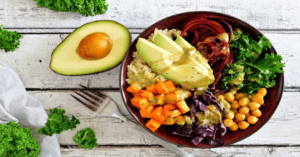In today’s fast-paced world, sugar is everywhere—from your morning coffee to processed foods that line supermarket shelves. While sugar provides a quick source of energy, it often leaves us craving more and contributes to health issues like weight gain, heart disease, and diabetes. A sugar-free diet can bring a host of health benefits, including stabilised energy levels, clearer skin, and improved mental clarity. Transitioning to a diet that reduces or eliminates added sugars can feel challenging, especially given sugar’s prevalence. However, with small, manageable steps, you can embrace a sugar-free lifestyle that nourishes your body and boosts your long-term wellbeing. Let’s explore the benefits of a sugar-free diet and practical ways to begin the journey.
Sugar-Free Diet Benefits and How to Start
Benefits of a Sugar-Free Diet
1. Improved Energy Levels

Sugar spikes your blood sugar quickly, leading to a burst of energy that’s often followed by a crash. A sugar-free diet helps maintain steady blood sugar levels, resulting in consistent energy throughout the day.
2. Enhanced Weight Management

Sugar adds empty calories, meaning it contributes to weight gain without offering essential nutrients. By cutting out added sugars, many people experience weight loss, particularly around the abdominal area, as insulin sensitivity improves and cravings decrease.
3. Reduced Risk of Chronic Illness

High sugar intake is linked to chronic diseases, including Type 2 diabetes, cardiovascular disease, and even some cancers. Reducing sugar consumption can lower these risks by helping to keep inflammation at bay and promoting a healthier heart and body.
4. Clearer Skin

A high-sugar diet can lead to breakouts and premature ageing as sugar promotes inflammation and the breakdown of collagen. Many people find that going sugar-free helps clear up acne and improves skin texture and elasticity.
5. Better Mental Health

Studies suggest a connection between high sugar intake and mental health issues, such as depression and anxiety. A sugar-free diet can stabilise mood swings, promote mental clarity, and may reduce the risk of depression.
How to Start a Sugar-Free Diet
1. Read Labels Carefully: Sugar is often hidden under names like sucrose, corn syrup, or agave nectar. Learning to spot these ingredients can help you avoid hidden sugars.
2. Switch to Natural Sweeteners: If you’re looking to sweeten foods, opt for natural alternatives like stevia or small amounts of honey.
3. Limit Processed Foods: Processed foods are a major source of hidden sugars. Cooking meals from scratch using whole foods, like fresh vegetables, fruits, lean proteins, and whole grains, can help keep your sugar intake in check.
4. Watch Your Beverages: Many drinks, including fizzy drinks and fruit juices, are packed with added sugars. Opt for water, herbal teas, or freshly squeezed juice instead.
5. Set Realistic Goals: Going sugar-free doesn’t have to be all-or-nothing. Start by reducing added sugars gradually, allowing your taste buds to adjust over time. Set achievable goals, like avoiding sugary snacks on weekdays or having one sugar-free meal a day.
Conclusion
Going sugar-free may seem daunting initially, but the benefits can make a profound impact on your overall health and happiness. With a steady approach and practical tips, you’ll find it easier to avoid sugar-laden foods, nourish your body, and enjoy the journey. By prioritising whole, unprocessed foods and reading labels carefully, you’ll be well on your way to a sustainable, sugar-free lifestyle.
Frequently Asked Questions About Starting a Sugar-Free Diet
1. What can I eat on a sugar-free diet?
Focus on whole foods like vegetables, fruits, lean proteins, whole grains, and unsweetened dairy. Avoid processed foods high in added sugars.
2. Is fruit allowed on a sugar-free diet?
Yes, most sugar-free diets allow natural sugars from fruits. Aim to consume fruits in moderation.
3. How long does it take to notice benefits?
Many people feel improved energy levels and reduced cravings within 1–2 weeks of reducing sugar intake.
4. Are sugar substitutes safe?
Natural alternatives like stevia and erythritol are generally considered safe, but it’s best to avoid artificial sweeteners like aspartame.
5. Can I still enjoy treats on a sugar-free diet?
Yes, you can make treats using natural sweeteners or enjoy small amounts of fruits as satisfying desserts.










